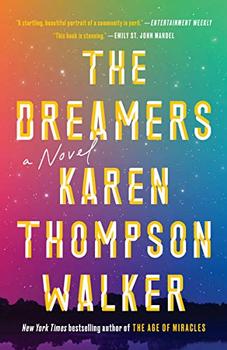Summary | Excerpt | Reading Guide | Reviews | Beyond the Book | Readalikes | Genres & Themes | Author Bio

She knows that these boys refer to her as quiet girl, as in Hey, quiet girl, it's okay to talk. She does not think of herself that way, as especially quiet, but there she was, as if under their sway: suddenly not talking.
"Jesus," said the one named Tom, who is taller than the others and plays basketball for the school team. He'd tied a red bandanna around his face, like a worker in a Civil War hospital. "That is foul," he said.
Every time she remembers it, that bandanna over his mouth, Mei's face turns hot with the shame of it.
In the end, she dropped the bag of cod down the trash chute at the end of the hall, ten floors down, the scrape of plastic on tin, while the boys gathered around her to make sure.
"I didn't know they'd be like that," Kara said later. This is how she learned that Kara was the one who told the boys about a smell in the room, though she'd said nothing at all to Mei.
This is one of the reasons that Mei spends her afternoons at a campus café, where, on this particular day in October, she waits until she is sure her roommate and the other girls will be gone from the floor, their hair dryers quiet, their flat-irons cool, and the girls themselves enmeshed by then in the complicated rituals of their sororities. The boys, she hopes, will be at dinner.
But when Mei gets back to the floor that night, nine hours after she left it, she finds a note, written in red, on the whiteboard that hangs on their door. "We're leaving," it says. "Where are you?" These words' - it is obvious' - are meant for her roommate.
When Mei unlocks the door, she finds Kara still lying where she left her that morning, her body curled toward the wall in the top bunk, her black boots still protruding from the sheets.
"Kara?" she says softly. Outside, the sun is sinking. The sky is clear and turning pink. Mei switches on the overhead light. "Kara?" she says again.
But Kara does not wake. Not to the sound of Mei's pleading, or to the louder voices of the two paramedics who soon detect' - through her badly wrinkled dress' - that she is breathing, at least, that she still has a pulse.
Kara sleeps through the screaming of the other girls as they see the way her head rolls back against the stretcher, the way her mouth hangs open, her brown hair falling loose across her face. She sleeps through the screeching of the crickets in the pine trees outside, and through the cool night air on her skin.
Mei stands barefoot on the sidewalk as the paramedics slide the stretcher into the bright bubble of the ambulance, a little roughly, thinks Mei. Be careful, she wants to say. And then the doors swing shut without her, leaving Mei alone in the street.
The paramedics will later report that the girl sleeps through the wail of the siren, too, and the flashing of the lights. She sleeps through the bumps of the potholed streets as the ambulance rushes toward St. Mary's, where, after several attempts, two doctors find that they cannot wake her, either.
On the other floors of the hospital that night, women labor while the girl sleeps. Babies are born while she sleeps. She sleeps while an old man dies in a distant room, an expected death' - his family gathered, a chaplain.
She sleeps through sunrise, and she sleeps through sunset.
And yet, in those first few hours, the doctors can find nothing else wrong. She looks like an ordinary girl sleeping ordinary sleep.
There will be some confusion, later, about what happened to her there, how her heart could have slowed so much without setting off the monitors. But this much is known to be true: over the course of many hours, her shallow breaths turn gradually shallower.
It is hard to say afterward why the final beats of her heart go unrecorded by those machines.
Chapter 3
The girls: they cry and cry, and they do not sleep. They sit around in their slippers and their sweats on the hard carpet of one another's rooms. They hold hands. They drink tea. If only they had checked on her sooner, they think. If only they had listened when she said she felt sick. They should have known, is the feeling. They should have done something. Maybe, they think, they could have saved her.
Excerpted from The Dreamers by Karen Thompson Walker. Copyright © 2019 by Karen Thompson Walker. All rights reserved. No part of this excerpt may be reproduced or reprinted without permission in writing from the publisher.
Your guide toexceptional books
BookBrowse seeks out and recommends the best in contemporary fiction and nonfiction—books that not only engage and entertain but also deepen our understanding of ourselves and the world around us.